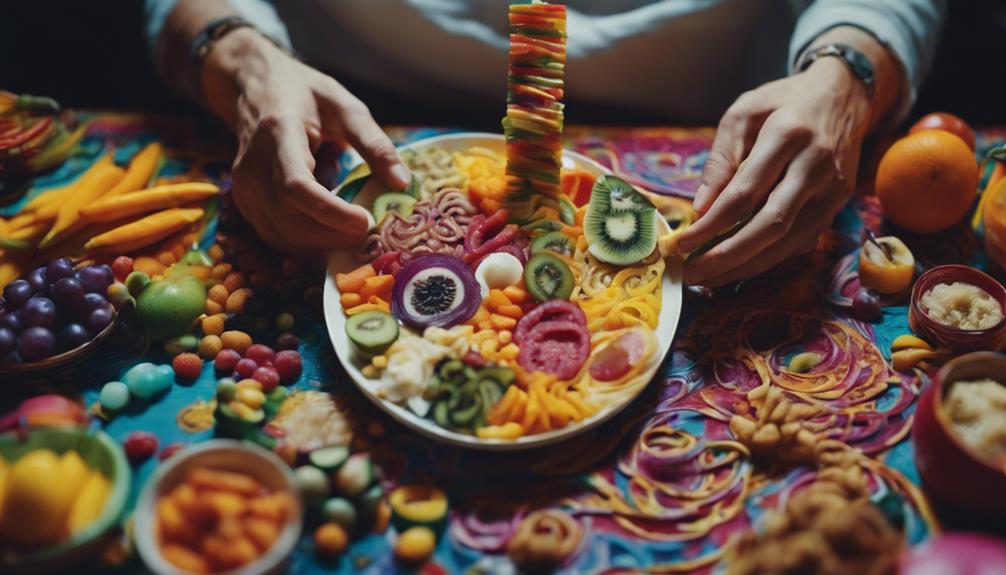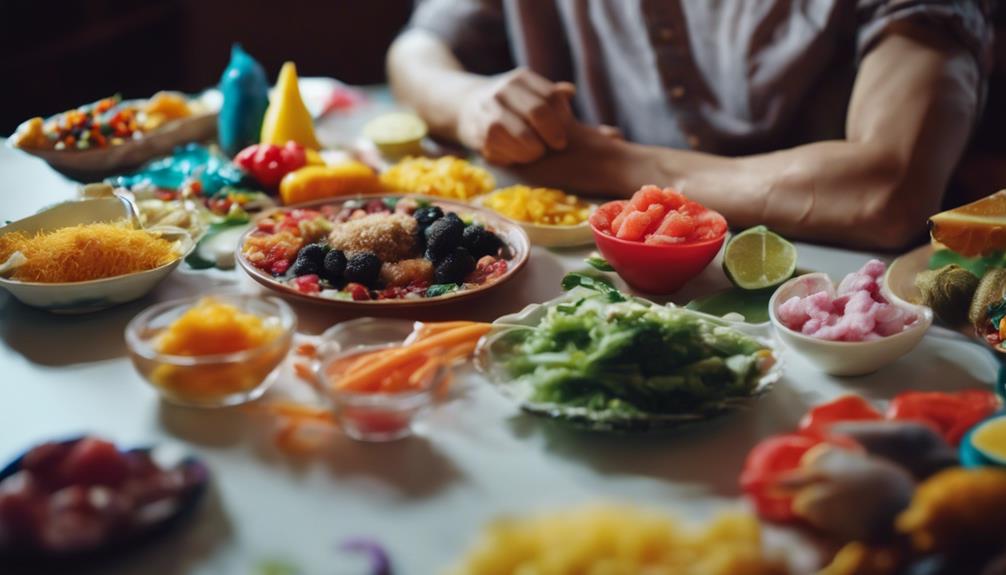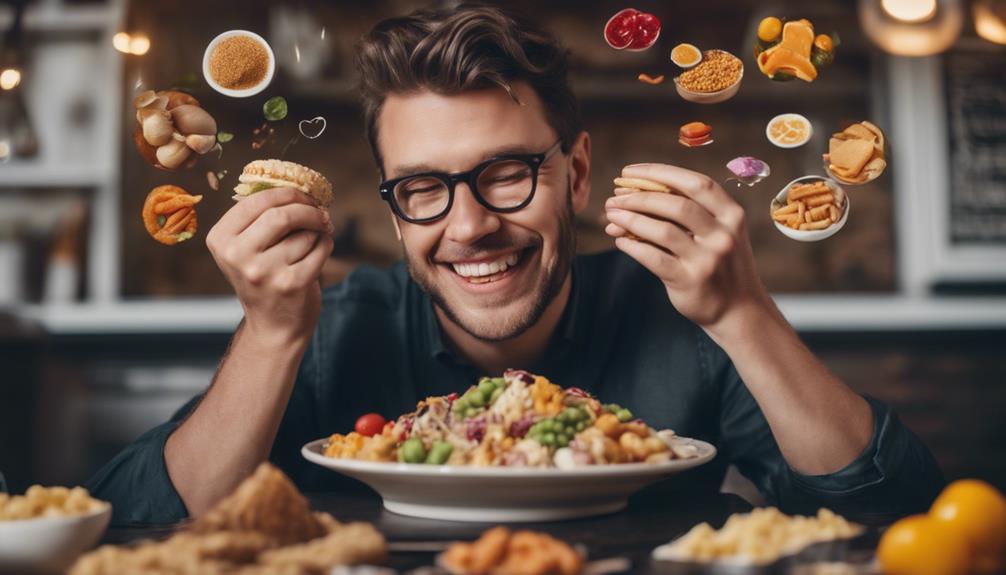
Hypnosis, EFT, and NLP are effective tools in conquering the fear of trying new foods. Hypnosis uncovers underlying causes and instills positivity. EFT tapping addresses emotional distress and rewires responses to food anxiety. NLP techniques reframe thoughts and behaviors positively. These methods help build confidence, reduce anxiety, and shift perceptions towards new foods. Success stories highlight significant transformations in culinary experiences. Transform your relationship with food through these powerful techniques.
Understanding Fear of Trying New Food
When exploring the complex domain of food phobias, it is crucial to understand the underlying fear that individuals may experience when faced with trying new foods. Cognitive therapy, a widely used approach, focuses on identifying and changing negative thought patterns associated with trying new foods. By challenging irrational beliefs and fostering a more positive mindset towards unfamiliar foods, individuals can gradually overcome their fear and resistance.
Exposure therapy, another effective method, involves gradually exposing individuals to feared foods in a controlled and supportive environment. This gradual exposure helps desensitize individuals to the feared stimuli and allows them to build confidence in trying new foods.
In cognitive therapy, individuals learn to reframe their thoughts about new foods, replacing fear with curiosity and openness to new experiences. Exposure therapy complements this by providing practical opportunities to confront and overcome their fear through gradual exposure. By combining these approaches, individuals can develop coping mechanisms to navigate their fear of trying new foods and expand their culinary horizons with confidence.
Exploring Hypnosis for Food Phobias

Exploring the potential of hypnosis in addressing food phobias reveals a promising avenue for individuals seeking alternative therapeutic approaches. Hypnosis offers a range of benefits that can aid in the eradication of food phobias. By accessing the subconscious mind, hypnosis can help individuals uncover the root causes of their fear of certain foods, allowing for targeted intervention. Through relaxation techniques and positive suggestion, hypnosis can reframe negative associations with food, promoting a more positive and open attitude towards trying new foods.
Furthermore, hypnosis can assist individuals in building confidence and reducing anxiety related to food consumption, creating a more relaxed and enjoyable eating experience. The power of suggestion in hypnosis can also help individuals develop a sense of control over their food choices and behaviors, empowering them to overcome food phobias.
Using EFT to Overcome Food Fears

Utilizing Emotional Freedom Techniques (EFT) can be a strategic approach in overcoming food fears and phobias effectively. EFT tapping, a central aspect of this technique, involves gently tapping on specific meridian points on the body while focusing on the emotional distress related to food anxiety. By addressing the root causes of the fear through this tapping process, individuals can experience a reduction in anxiety levels associated with trying new foods.
Food anxiety, a common issue among individuals with food fears, can be effectively managed through consistent EFT practice. The repetitive tapping motions help in rewiring the brain's response to certain foods, gradually reducing the intensity of negative emotions linked to them. This process can lead to a shift in perception, making it easier for individuals to approach new foods with a sense of curiosity rather than fear.
NLP Techniques for Trying New Foods

Implementing Neuro-Linguistic Programming (NLP) techniques can be instrumental in facilitating the process of trying new foods for individuals struggling with food fears and anxieties. NLP focuses on behavior change and mental conditioning, offering a structured approach to reframe thoughts and emotions related to food experiences.
One effective NLP technique for trying new foods is the 'Swish Pattern.' This technique involves mentally rehearsing a sequence where the undesirable food is replaced with a preferred food, creating a positive association. By repeatedly practicing this visualization, individuals can reprogram their responses to new foods.
Another valuable NLP tool is 'Anchoring.' This technique involves associating a specific sensory trigger, such as a touch or a smell, with a positive emotional state. By anchoring positive emotions to the experience of trying new foods, individuals can gradually reduce their fear and anxiety.
Success Stories: Transforming Food Relationships

Building upon the effectiveness of NLP techniques in overcoming food phobias, real-life success stories exemplify the transformative power of reshaping individuals' relationships with food. These personal transformations and dietary breakthroughs highlight the profound impact of utilizing hypnosis, EFT, and NLP in fostering healthier attitudes towards food. Culinary adventures and taste bud triumphs become achievable as individuals conquer their fears and embrace new gastronomic experiences.
- Overcoming Childhood Trauma: A client who suffered from childhood food trauma successfully reintroduced a variety of foods into their diet, leading to a newfound appreciation for different flavors and textures.
- Exploring Global Cuisines: Through NLP sessions, a once-picky eater expanded their palate, now delighting in diverse international cuisines and ingredients.
- Weight Loss Journey: By addressing underlying emotional barriers with hypnosis, a client not only overcame their fear of certain foods but also achieved significant weight loss goals.
- Family Mealtime Harmony: EFT techniques helped a family resolve food-related conflicts, fostering a harmonious dining environment and encouraging healthier eating habits for all members.
Frequently Asked Questions
Can Hypnosis, Eft, and NLP Be Used Together in a Single Session to Address Food Phobias?
Combining techniques like hypnosis, EFT, and NLP in a single session can offer an individualized approach to addressing food phobias. Success rates may vary based on the client's receptiveness and the skill of the practitioner.
Are There Any Potential Side Effects or Risks Associated With Using Hypnosis, Eft, or NLP for Overcoming Food Fears?
When exploring potential risks and long-term effects of interventions like hypnosis, EFT, or NLP for overcoming food fears, it is important to prioritize safety measures and precautionary steps. Careful selection of qualified practitioners and thorough assessment can help mitigate any adverse outcomes.
How Long Does It Typically Take for Someone to See Results When Using Hypnosis, Eft, or NLP for Food Phobias?
Success rates and timeline for overcoming food phobias with hypnosis, EFT, or NLP vary due to individual differences. Generally, noticeable results can be seen within a few sessions, with some experiencing improvement sooner. Effectiveness is often influenced by commitment and practitioner skill.
Are There Specific Foods or Types of Food Phobias That Are More Difficult to Address Using These Techniques?
When addressing food phobias, certain preferences and cultural influences can make some types of food aversions more challenging to overcome. Factors like food textures and sensory sensitivities may also impact the difficulty level in resolving these phobias.
Can These Techniques Be Used to Help Children or Individuals With Developmental Disabilities Overcome Their Fear of Trying New Foods?
Children's therapy that incorporates sensory integration techniques can effectively help children or individuals with developmental disabilities overcome their fear of trying new foods. By addressing sensory sensitivities and gradually exposing them to new tastes, textures, and smells, progress can be made.
Conclusion
To sum up, hypnosis, EFT, and NLP techniques have shown promising results in resolving the fear or phobia of trying new foods. These methods can help individuals overcome their food-related anxieties and develop a healthier relationship with food.
By addressing the underlying causes of these fears, individuals can experience a positive transformation in their eating habits and overall well-being.
Further research and exploration into these techniques may offer valuable insights for individuals struggling with food phobias.
Take the Next Step
Do not be afraid to reach out to me, Mark E Wilkins, to assist you in any issues you might have. Most Hypnotherapy sessions last 2 hours and EFT Sessions are usually handled with one session. Life Coaching is 45 minute session, once a week. Self-Hypnosis is taught in one session, and lasts a lifetime.
To make an appointment, first listen to the Pre-talk and fill out he Complementary Healthcare Provider Disclosure. The use the Contact Form to request an appointment with the Bohol Hypnosis Expert.
Self-help downloads are available. The self-hypnosis program to teach you how to self-hypnotize is here.





